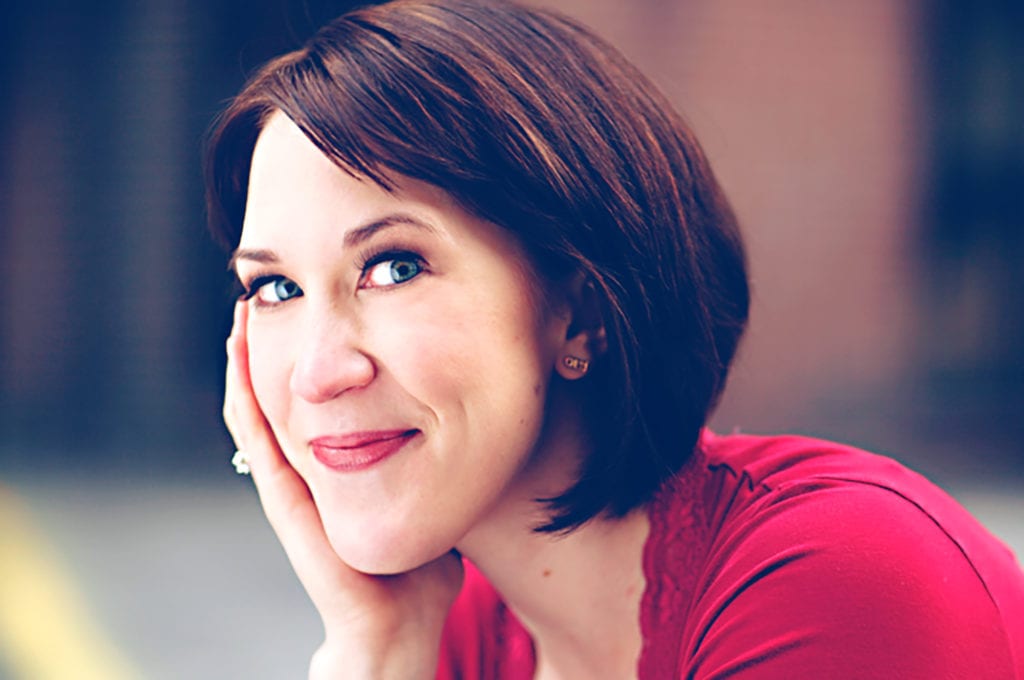
We asked Stacey Cabaj, the new Program Director for the MFA in Performance Pedagogy (MFAPP) Program, about her long and varied theatre career, what drew her to academia, and why she thinks the MFAPP Program is such an excellent option for professional performers who are truly passionate about theatre.
What first drew you to theatre?
My first time onstage was as the lion in my Dad’s choir concert performance of “The Lion Sleeps Tonight.” I loved then, as I do now, experiencing the live exchange of energy in the room – the laughter, the surprise, the transformation. Like many performing artists, my career since then has been surprising and varied. I’ve done a bit of everything: television and film, voiceover, vocal coaching, musical theatre, new work, and classical theatre. I have always approached the business with curiosity and the spirit of “yes, let’s,” accepting any opportunity to work with artists I respect, on material that challenges me, and that sustains my life offstage.
What made you decide to pursue a career in academia?
I loved being a student and had some extraordinary teachers who truly seemed to enjoy their work. One of my mentors introduced me to Stephen Nachmanovitch’s book Free Play: Improvisation in Life and Art in which he writes: “Education is the building of a person. To educe means to draw out or evoke that which is latent; education then means drawing out the person’s latent capacities for understanding and living….” The altruism of that particularly appealed to me. As a professor of theatre, I’m not only providing vocational skills, I’m also striving to foster the students’ imagination, passion, empathy, play, communication, and self-awareness, all vital skills to thriving in the human experience.
And what is your educational background?
I attended the Boston Conservatory at Berklee where I earned a B.F.A. in Musical Theatre Performance. After a year as an Acting Fellow at The Shakespeare Theatre in Washington, D.C., I enrolled in the M.F.A. in Theatre Pedagogy Program at Virginia Commonwealth University. Since graduate school I’ve pursued additional teaching certifications in The Meisner Approach to Acting, Vibrant Voice Technique, and Vocal Yoga.
As an academic, how do you stay involved and current on theatre trends?
Well, I still work consistently as an actor. My most recent performance adventures include playing the title role in Mary Poppins at Virginia Repertory Theatre, Goneril in King Lear at New Orleans Shakespeare, and as a voiceover artist for the Sleep Number Corporation. I also work as a voice, speech, and dialect coach for actors and professional clients.
In your view, what is so special about LMU’s MFAPP Program?
The program is one of a handful of graduate programs in the country that focuses on performance pedagogy. We support mid-career professionals’ transition to teaching theatre at the secondary and post-secondary levels. We provide intensive pedagogical training, individualized courses of study with numerous elective options, and opportunities to teach at the undergraduate level. The program is very flexible, offering both part-time and full-time options. We accept students year-round and our classes are held in the late afternoons and early evenings on our beautiful campus in west Los Angeles.
What do you think is the biggest benefit of the program?
The biggest benefit is that the program uniquely positions its graduates for success on the academic job market. Our students are admitted to the pedagogy program with impressive careers as theatre artists, and will graduate with the skills and knowledge to step confidently into new teaching positions.
What do you do in your spare time?
Right now, I’m prioritizing adventure, connection, wellness and wellbeing. I particularly enjoy hiking, obstacle course racing, gardening, yoga, meditation, reading, traveling, spending time with my family, and exploring California.
Photo by Eric Laurits



